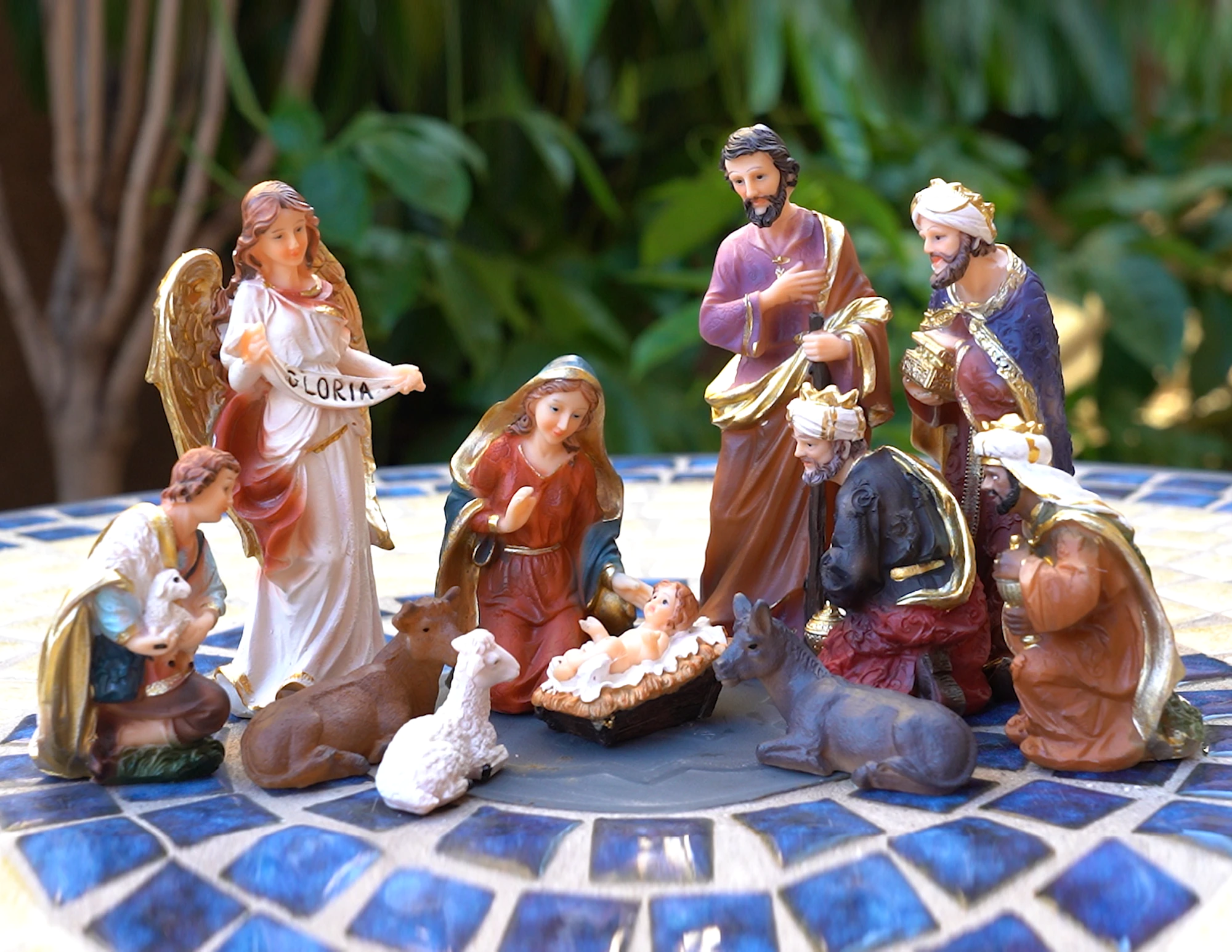By: Daniel Merritt, PhD | December 4, 2022
Christianity is a covenantal religion. Its documents are covenantal documents. The covenant theme, interwoven throughout the Bible, is a fundamental doctrine in the sacred volume. The covenant theme is essential to the very foundation of developing a proper biblical theology. An understating of biblical covenants is indispensable to understanding the Christ event and the meaning of Christmas.
The Term Berith and the Covenant
The Hebrew word for covenant is berith. One cannot derive a clear meaning of the term from etymology alone. Some scholars are of the opinion that it is derived from the Hebrew verb barah, meaning “to cut,” and is a reminder of the ceremony mentioned in Genesis 15:17. Others, however, contend that it is derived from the Assyrian word beritu, meaning “to bind or fetter.” This would at once point to the covenant as a bond.
The word berith denotes a voluntary mutual agreement but also a disposition or arrangement imposed by one party on another. The word berith appears nearly 300 times in the Old Testament (OT). One finds many covenants between individuals. For example, Jacob and Laban made a covenant to settle the animosity that had developed between them. (Gen. 31:44-45) David and Jonathan made a covenant solidifying their friendship. (1 Sam. 18) Also, in the OT, one finds covenants between kings (I Kings 20:34), between a king and his subjects (2 Kings 11:4), between tribes (Judges 2:2), but the most common covenant in the OT was the marriage covenant (Mal. 2:14).
Divine-Human Covenants, Christ, and Christmas
While there are many instances in the OT of covenants between individuals, tribes, kings, and their subjects, the most important covenants were the divine-human covenants between God and man. Leon Morris has written, “It is not too much to say that the covenant conception came to dominate Israel’s thought about her relationship to God” (Morris, The Apostolic Preaching of the Cross, 81).
A divine-human covenant could be defined as a contract, bond, or agreement dealing with relationship of obligation established as the result of divine initiative, ratified by a divine oath or positive declaration. Morris further states, “What is peculiar to the Hebrew religion is that this union, fellowship, and partnership with the Deity is based on a legal arrangement called a covenant…a legal basis is inherent in the very nature of the covenant” (257). God desires a relationship with His people, and one finds in divine covenants the basis on which man can fellowship with a holy God. God’s covenants were tied to His very nature and desire to establish fellowship with humanity.
In the Bible, scholars may differ regarding the number of divine-human covenants. Still, the six major ones are Adamic Covenant, Noahic Covenant, Abrahamic Covenant, Mosaic Covenant, Davidic Covenant, and New Covenant. While six in number, they are interwoven and linked together in unity, each finding their ultimate fulfillment in Jesus Christ.
The Adamic Covenant, Christ, and Christmas
(1) The Adamic Covenant, whereby God sets forth His plan for humanity to have unbroken fellowship with Him, for man to be the image bearer of God, to subdue the earth, filling the earth with His glory. (Gen. 1:28; Ps. 86:9, 96:3; Hosea 6:7; Hab. 2:14) Adam’s relationship with the Lord was more than a personal relationship, but as head or representative of humankind, his relationship involved all in his loins. However, Adam sinned, and, according to Paul, all who flow from Adam sin, as well. (Romans 5:17-18) In Genesis 3:15, God promises Adam that One would come who would restore what the entrance of sin ruined.
The Noahic Covenant, Christ, and Christmas
(2) The Noahic Covenant is found in Genesis 6:8-18. Humanity had grievously departed from God and plunged into a cesspool of sin. As a result of the awful wickedness upon the earth, God commanded Noah to build the ark as the means of redemption from the judgment of the flood. Since man failed miserably in the Noahic Covenant, God is reaffirming the original plan for humanity to be His divine image bearers which was initially laid out in Eden. God, in grace, preserved the created order from the oath of His covenant with Noah. Humanity benefited from God’s covenant with Noah, and the Lord repeated to him the mandate first given to Adam. (Gen. 9)
The Abrahamic Covenant, Christ, and Christmas
(3) The Abrahamic Covenant was a divine promise and divine covenant where God chose one man through which He would progressively unfold His plan of redemption. The divine initiative was to bless all humanity, all nations of the earth, by blessing Abraham and his Seed which would flow from his loins. (Genesis 15, 17, and 22) The covenant was sealed by Abraham dividing several animal sacrifices into pieces and placing them in two rows, forming an aisle. (Gen. 15).
Normally, the two parties would walk together down the aisle between the divided sacrifices, but while Abraham was in a deep sleep, God passed alone through the parts of the sacrifice, ratifying the promises of the covenant by His own oath and existence. The Abrahamic Covenant was the Good News of Christ in promise, culminating through Israel, the Seed, unto Calvary, and ultimately unto the New Jerusalem. And in Abraham’s willingness to offer Isaac as a sacrifice, the OT longed for that perfect sacrifice, that one final sacrifice that would suffice for all humanity. (Gen. 22)
The Mosaic Covenant, Christ, and Christmas
(4) The Mosaic or Sinaitic Covenant was the most important covenant made between God and Abraham’s descendants, Israel, which particularizes the scope of the covenant yet has implications for all humanity. (Ex. 19-24) The Covenant of Sinai was ratified by a blood sacrifice and by a covenant meal eaten in God’s presence by those involved. (Ex. 24) The Law being a central feature of the Mosaic Covenant, Israel was to obey the Law, to be a light to the other nations, as bearers of God’s image, filling the earth with the glory of God. However, they failed miserably, unable to fulfill God’s Law; therefore, One greater than Moses must come to fulfill what Israel was unable to do. While the Mosaic Covenant was a system of types and shadows, each pointed to the day the shadows would become substance.
The Davidic Covenant, Christ, and Christmas
(5) The Davidic Covenant (2 Samuel 7:12-14) was a promise, a covenant, of divine initiative between God and David that an everlasting dynasty and King will be established from his royal line, centered in Jerusalem, where David’s “Son” (descendant), the Messiah, will rule and reign. The promise made to the patriarchs would be fulfilled and renewed in the Davidic Covenant. Like the Abrahamic Covenant, the Davidic Covenant looked into the future to the arrival of the promised Seed, the Messianic King. (Isa. 9:6)
The New Covenant, Christ, and Christmas
(6) The New Covenant. Amid Israel’s tragic, sinful failure, exiled and during their darkest hour, in Babylonia captivity, through the prophet Jeremiah, the Lord promised a “new covenant.” (Jer. 31:31-34) From other passages, one discovers significant features of the New Covenant. Sins will be forgiven. (Isa. 53:4–12, Jer. 31:34, Heb. 9:15) The Law will be written on the heart instead of stone, and a change in the human heart by the Holy Spirit will enable conformity to the Law. (Deut. 30:1–10; Jer. 31:33–34; Ezek. 36:25–27; Rom. 5:5).
While the covenant was with Israel, the effects of the New Covenant would extend to all the nations of the earth. (Isa. 42:6, 49:6, 54:1–10; Ps. 87; Acts 13:47) The covenant is related to the coming new heavens and earth, whereby God’s temple presence among His people will be perpetual and everlasting. (Isa. 65:17–25; Ezek. 40–48, Rev. 21) The New Covenant is the last covenant. The New Covenant completes and fulfills God’s plan of redemption.
Christ as the Second Adam, His Covenant, and Christmas
Of the six major divine-human covenants, Jesus Christ fulfills and is the fulfillment of each covenant. Christ is the Second Adam, the express image of God who perfectly obeyed God and is the true image bearer of God and shines His light into the darkness of this world, bringing all creation under His subjection. (1 Pet. 2:9, Rev. 1:6, 5:10, 20:6) As in Adam all die, in the second Adam, Jesus Christ, one is made alive. (Rom. 5:17; I Cor. 15:21-22) Christ fulfills the Abrahamic Covenant, both in His role as the obedient covenant sacrifice (Gen 15:17, 22:7–9) and as the ultimate Seed in whom all the nations are blessed (Gen. 22:18, Gal. 3:8).
Christ fulfills the Mosaic Covenant, as obedient Israel in regard to keeping the Law, who is a light to the nations (Isa. 49:6, Acts 26:23), and who is the Substance of all the shadows of the Mosaic system (Col. 2:17). Christ is the One greater than Moses. (Heb. 3:1-6) Christ fulfills the Davidic Covenant as the son of David, the divine Son of God, ruling over the nations. (Rev. 11:15–17) Christ is the perfect Davidic shepherd-king, thus fulfilling the covenant with David. (Isa. 55:3; Ezek. 37:21–28) Christ is the “Surety (one who fulfills the obligation on behalf of another) of a better covenant” (Heb. 7:22), the New Covenant, sealed in His blood shed on Calvary’s cross.
Conclusion
To those who say the OT study of covenants is not important, one needs to realize there is a vital (divine) link between divine-human covenants of the OT and the New Covenant. They are linked together like Siamese Twins. To separate them is to miss the marvel of God’s progressive revelation and the unfolding of His plan of redemption, culminating in Jesus Christ. More importantly, when one grasps the importance covenants played in the OT, we come nearer to understanding God’s mind in dealing with humanity. However, more importantly, we get a glimpse into our Lord’s very heart. It is a heart that, in grace, gives us Christmas and God’s greatest gift to humanity, Jesus Christ.
Merry Christmas,
Dr. Dan
About the Author

Dr. Merritt is no stranger to Bellator Christi. He has been featured as a guest contributor on the website for many articles, including one of his biggest hits, “Voltaire’s Prediction: Truth or Myth,” before joining Bellator Christi as a regular contributor. Dr. Merritt received both a Ph.D. and a Th.D. and has studied theology, philosophy, and biblical studies at North-Western Theological Seminary, Southeastern Baptist Theological Seminary, and Campbell University. Dr. Merritt has published such books as Writings on the Ground and Dealing Effectively with Church Conflict. Merritt serves as the Director of Missions for the Surry Baptist Association after serving numerous churches in northwestern North Carolina. He also teaches and directs the Seminary Extension of the Southern Baptist Convention in the Mount Airy, NC area. In his spare time, Merritt serves as a track coach, training the next generation of runners.
Copyright, 2022. BellatorChristi.com.






[…] Source: Covenants, Christ, and Christmas […]